人教新目标(Go for it)版 七年级上Unit 6 Do you like bananas-Section A Grammar Focus-3c 2课件(共23张PPT)
文档属性
| 名称 | 人教新目标(Go for it)版 七年级上Unit 6 Do you like bananas-Section A Grammar Focus-3c 2课件(共23张PPT) | 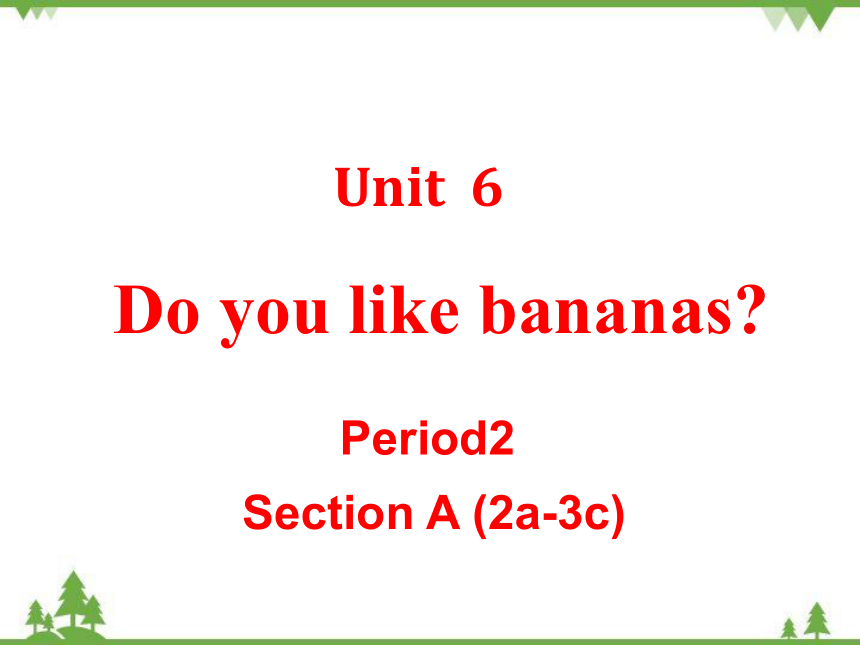 | |
| 格式 | ppt | ||
| 文件大小 | 2.0MB | ||
| 资源类型 | 教案 | ||
| 版本资源 | 人教新目标(Go for it)版 | ||
| 科目 | 英语 | ||
| 更新时间 | 2022-07-06 13:56:01 | ||
图片预览

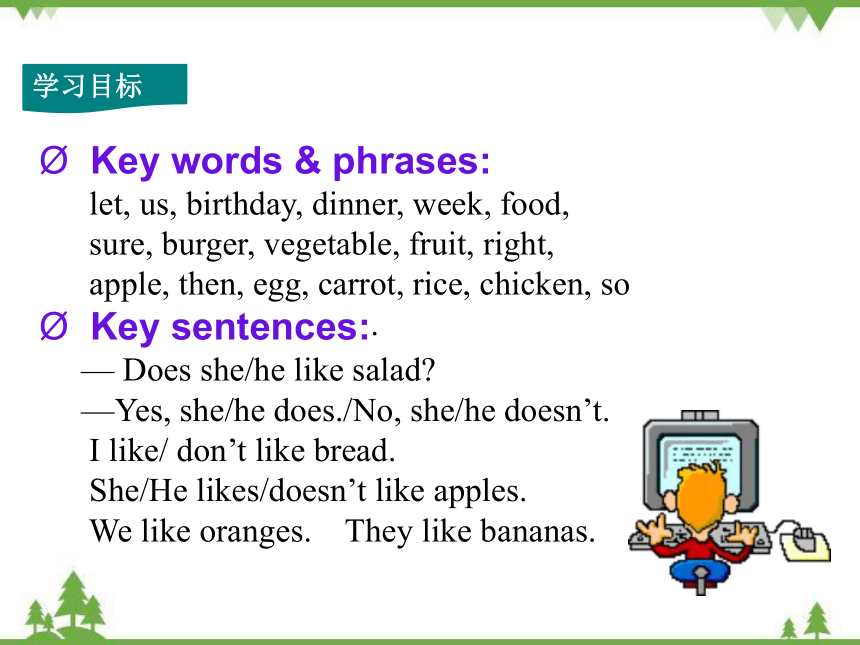
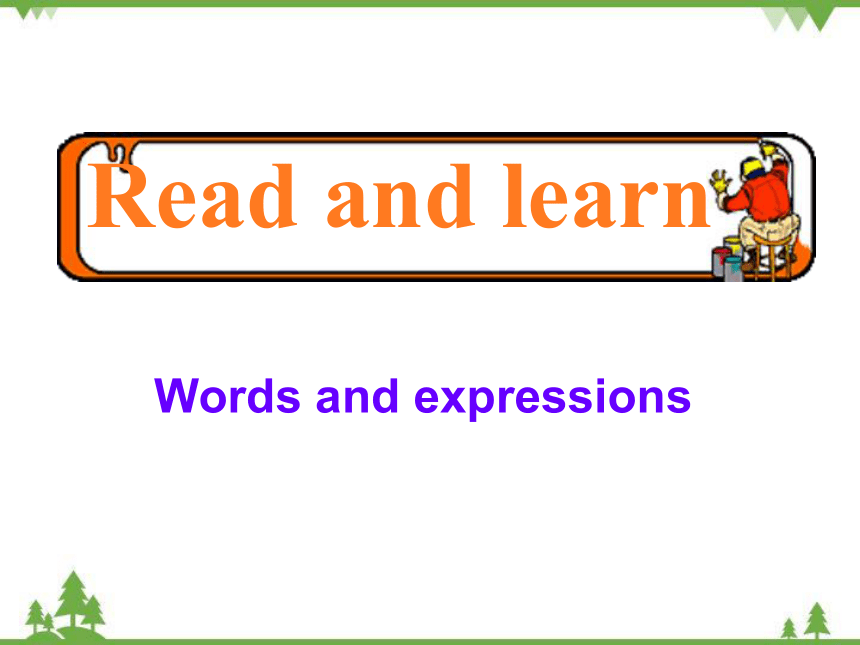
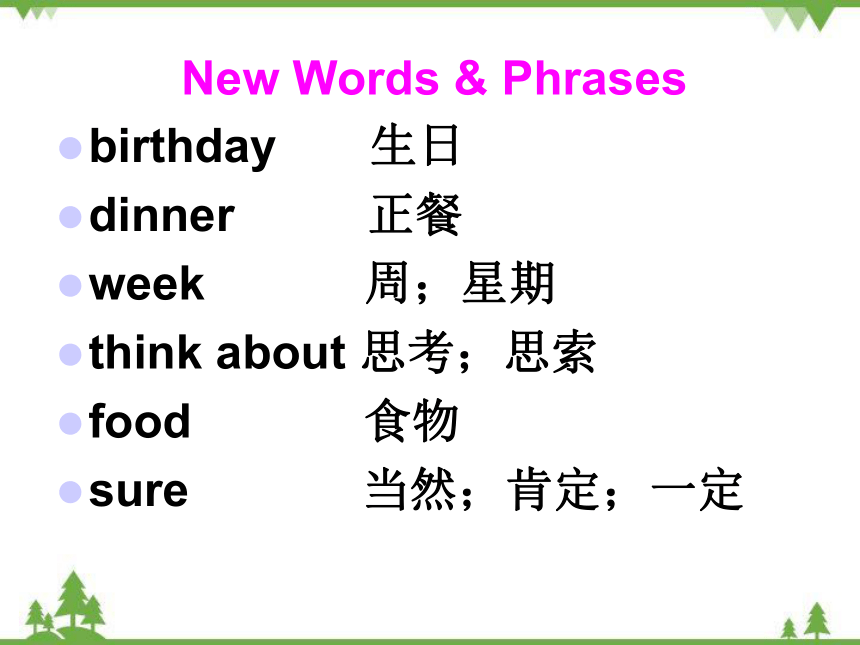
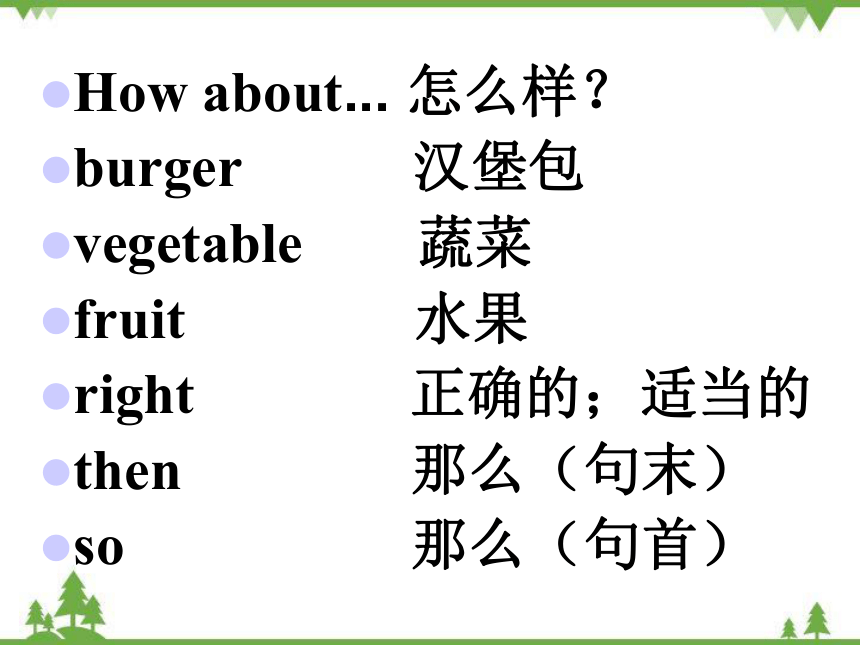
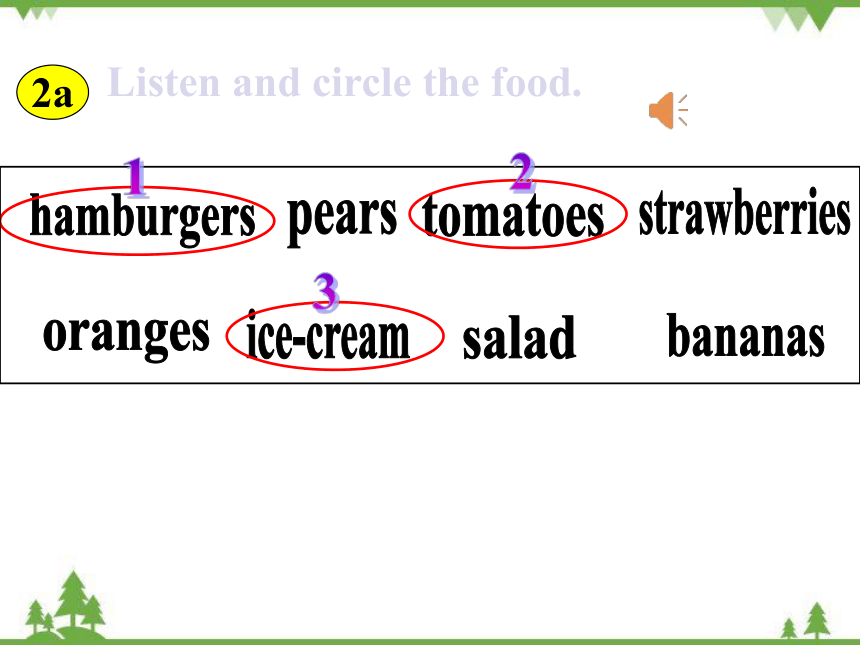
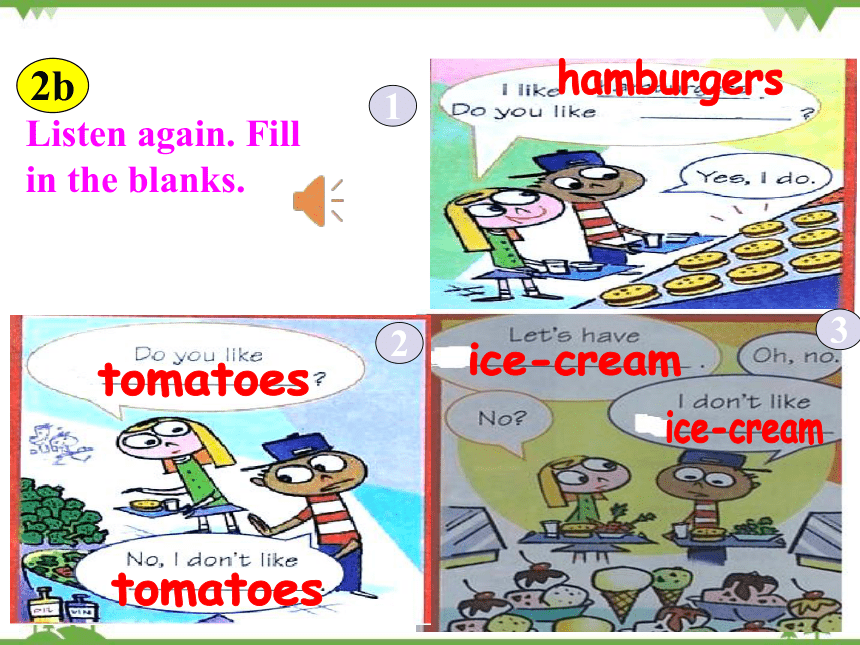
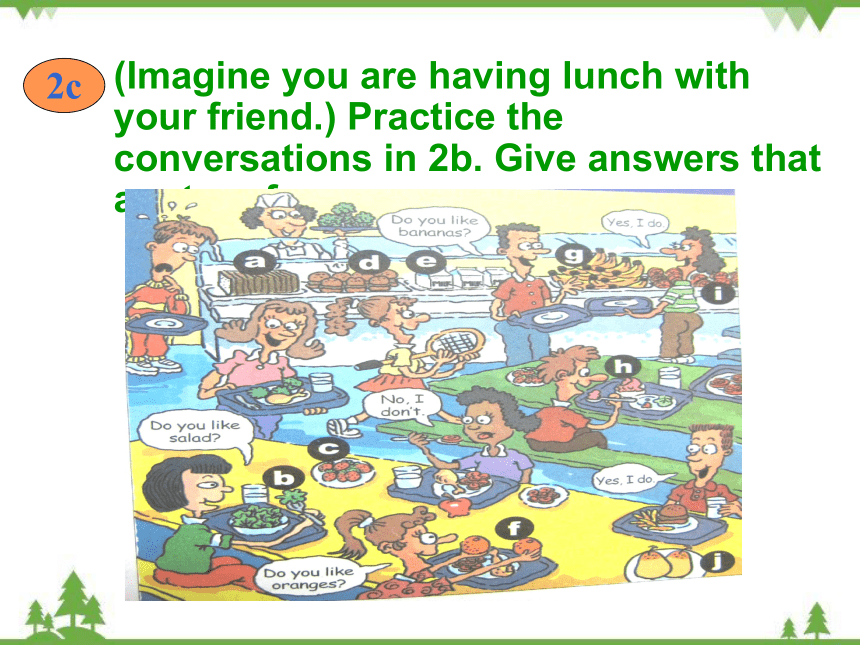
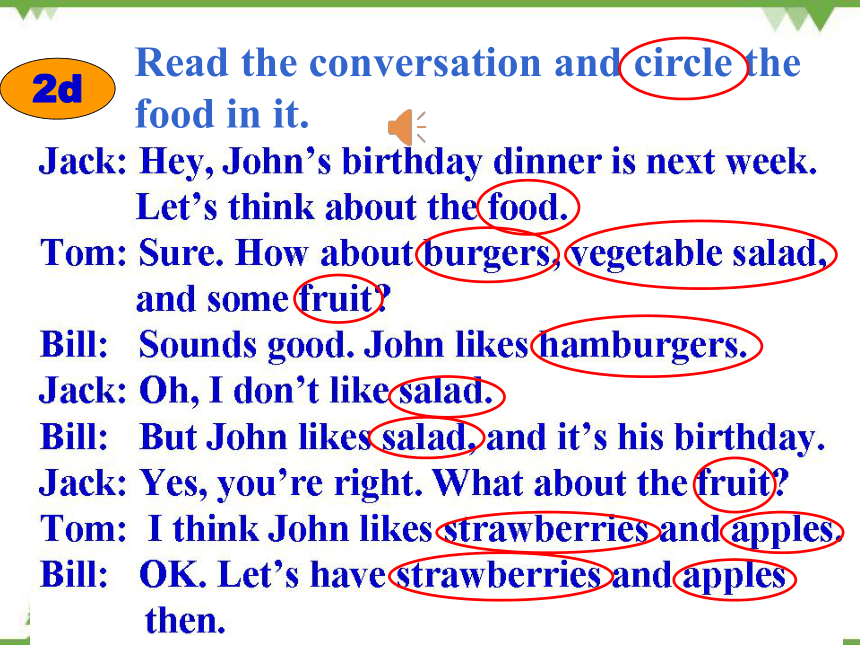
文档简介
(共23张PPT)
Period2
Section A (2a-3c)
Unit 6
Do you like bananas
学习目标
Key words & phrases:
let, us, birthday, dinner, week, food,
sure, burger, vegetable, fruit, right,
apple, then, egg, carrot, rice, chicken, so
Key sentences:.
— Does she/he like salad
—Yes, she/he does./No, she/he doesn’t.
I like/ don’t like bread.
She/He likes/doesn’t like apples.
We like oranges. They like bananas.
Read and learn
Words and expressions
birthday 生日
dinner 正餐
week 周;星期
think about 思考;思索
food 食物
sure 当然;肯定;一定
New Words & Phrases
How about... 怎么样?
burger 汉堡包
vegetable 蔬菜
fruit 水果
right 正确的;适当的
then 那么(句末)
so 那么(句首)
Listen and circle the food.
2a
Listen again. Fill in the blanks.
1
2
3
2b
2c
(Imagine you are having lunch with your friend.) Practice the conversations in 2b. Give answers that are true for you.
2d
Read the conversation and circle the food in it.
2d
Answer the questions below and then role-play the conversation.
When(什么时候) is John’s birthday dinner
It’s next week.
2. What food does John like
Hamburgers, salad, strawberries and apples.
3. What food doesn’t he like
We don’t know.
4. Does Jack like salad
No, he doesn’t.
5. What food will(将) they have on John’s
birthday
Hamburgers, vegetable salad and some fruit.
小结:主语不是三人称单数时,谓语动词用动词原形(like), 疑问句和否定句中用助动词do。主语是三人称单数时,谓语动词词尾加-s/-es (likes), 疑问句和否定句中用助动词does。 疑问句和否定句中用到does后,谓语动词用原形(like).
小结:名词分为可数名词和不可数名词。可数名词有单数和复数之分,而不可数名词没有复数形式。有的名词因为有不同含义,所以有时是可数名词,有时是不可数名词。
此外,我们谈论喜欢“某物”时,意思是“某类事物”,这时可数名词要用复数形式来表示。不可数名词则无需变化。
3a
Underline the correct words in the brackets.
思考并讨论:
什么时候需要用 likes 或者doesn’t?什么时候用like或者don’t
like 后面的名词为什么有时词尾要加-s/-es, 有的时候为什么不加-s/-es ?
3b
Number these sentences [1 - 4] to make a conversation.
Make your own conversations in pairs.
so: 英语口语中常用的语气词,相当于汉语中的“于是,那么,这样一来”,其承上启下的作用。
?
3c
Ask your classmates about the food in the chart. Find out what they like and don’t like.
Grammar
一般现在时的否定句式和疑问句式
(1)be 动词
(2)have 动词
(3)行为动词
主语+
am is are
+ not +表语
主语+
don’t doesn’t
(三单)
+ have + 宾语
don’t doesn’t
主语+
(三单)
+ 动原 + 状语
动词一般现在时的否定句式
(1)be 动词
(2)have 动词
(3)行为动词
主语+
Am Is Are
表语
主语+
Do Does
(三单)
have+宾语+
Do Does
主语+
(三单)
动原+状语+
动词一般现在时的疑问句式
句型:
1、一般疑问句:
1>Do you like strawberries?
Yes,I do./No,I don’t.
2>Do they/Tom and Helen… like broccoli
Yes,they do./No,they don’t.
3>Does she/he/Lucy/Bob/your mother… like potatoes (三单)
Yes, she/he does. No,she/he doesn’t.
4> 肯定句变一般疑问句。(*助动词do/does提前)
e.g.They like tomatoes.
Do they like tomatoes
(助动词do提前)
My brother likes French fries.
Does your brother like French fries
(助动词does提前)
2> They/We/You like bananas, but they/we/you don’t like pears.
2、肯定句、否定句。
1> I like hamburgers, but I don’t like ice cream.
3> She/He/Lucy/Mr. Lee likes meat, but she/he doesn’t like chicken.
4> 肯定句变否定句。(助动词do/does+not,置于动词前)
e.g. Paul and Lucy ____ ____(not like) rice.
don’t like
Her cousin _____ _____(not eat) carrots.
doesn’t eat
Bob _____ ______(not play) soccer every day.
doesn’t play
hamburger
hamburgers
Does he like hamburgers
Yes , he does .
He likes hamburgers .
Write down the conversation(2c) between your and your partner.
Write a report according to the survey.
Period2
Section A (2a-3c)
Unit 6
Do you like bananas
学习目标
Key words & phrases:
let, us, birthday, dinner, week, food,
sure, burger, vegetable, fruit, right,
apple, then, egg, carrot, rice, chicken, so
Key sentences:.
— Does she/he like salad
—Yes, she/he does./No, she/he doesn’t.
I like/ don’t like bread.
She/He likes/doesn’t like apples.
We like oranges. They like bananas.
Read and learn
Words and expressions
birthday 生日
dinner 正餐
week 周;星期
think about 思考;思索
food 食物
sure 当然;肯定;一定
New Words & Phrases
How about... 怎么样?
burger 汉堡包
vegetable 蔬菜
fruit 水果
right 正确的;适当的
then 那么(句末)
so 那么(句首)
Listen and circle the food.
2a
Listen again. Fill in the blanks.
1
2
3
2b
2c
(Imagine you are having lunch with your friend.) Practice the conversations in 2b. Give answers that are true for you.
2d
Read the conversation and circle the food in it.
2d
Answer the questions below and then role-play the conversation.
When(什么时候) is John’s birthday dinner
It’s next week.
2. What food does John like
Hamburgers, salad, strawberries and apples.
3. What food doesn’t he like
We don’t know.
4. Does Jack like salad
No, he doesn’t.
5. What food will(将) they have on John’s
birthday
Hamburgers, vegetable salad and some fruit.
小结:主语不是三人称单数时,谓语动词用动词原形(like), 疑问句和否定句中用助动词do。主语是三人称单数时,谓语动词词尾加-s/-es (likes), 疑问句和否定句中用助动词does。 疑问句和否定句中用到does后,谓语动词用原形(like).
小结:名词分为可数名词和不可数名词。可数名词有单数和复数之分,而不可数名词没有复数形式。有的名词因为有不同含义,所以有时是可数名词,有时是不可数名词。
此外,我们谈论喜欢“某物”时,意思是“某类事物”,这时可数名词要用复数形式来表示。不可数名词则无需变化。
3a
Underline the correct words in the brackets.
思考并讨论:
什么时候需要用 likes 或者doesn’t?什么时候用like或者don’t
like 后面的名词为什么有时词尾要加-s/-es, 有的时候为什么不加-s/-es ?
3b
Number these sentences [1 - 4] to make a conversation.
Make your own conversations in pairs.
so: 英语口语中常用的语气词,相当于汉语中的“于是,那么,这样一来”,其承上启下的作用。
?
3c
Ask your classmates about the food in the chart. Find out what they like and don’t like.
Grammar
一般现在时的否定句式和疑问句式
(1)be 动词
(2)have 动词
(3)行为动词
主语+
am is are
+ not +表语
主语+
don’t doesn’t
(三单)
+ have + 宾语
don’t doesn’t
主语+
(三单)
+ 动原 + 状语
动词一般现在时的否定句式
(1)be 动词
(2)have 动词
(3)行为动词
主语+
Am Is Are
表语
主语+
Do Does
(三单)
have+宾语+
Do Does
主语+
(三单)
动原+状语+
动词一般现在时的疑问句式
句型:
1、一般疑问句:
1>Do you like strawberries?
Yes,I do./No,I don’t.
2>Do they/Tom and Helen… like broccoli
Yes,they do./No,they don’t.
3>Does she/he/Lucy/Bob/your mother… like potatoes (三单)
Yes, she/he does. No,she/he doesn’t.
4> 肯定句变一般疑问句。(*助动词do/does提前)
e.g.They like tomatoes.
Do they like tomatoes
(助动词do提前)
My brother likes French fries.
Does your brother like French fries
(助动词does提前)
2> They/We/You like bananas, but they/we/you don’t like pears.
2、肯定句、否定句。
1> I like hamburgers, but I don’t like ice cream.
3> She/He/Lucy/Mr. Lee likes meat, but she/he doesn’t like chicken.
4> 肯定句变否定句。(助动词do/does+not,置于动词前)
e.g. Paul and Lucy ____ ____(not like) rice.
don’t like
Her cousin _____ _____(not eat) carrots.
doesn’t eat
Bob _____ ______(not play) soccer every day.
doesn’t play
hamburger
hamburgers
Does he like hamburgers
Yes , he does .
He likes hamburgers .
Write down the conversation(2c) between your and your partner.
Write a report according to the survey.
同课章节目录
- starters 预备篇(2012秋审查)
- Unit 1 Good morning !
- Unit 2 What’s this in English?
- Unit 3 What color is it ?
- Unit 1 My name's Gina.
- Section A
- Section B
- Unit 2 This is my sister.
- Section A
- Section B
- Unit 3 Is this your pencil?
- Section A
- Section B
- Unit 4 Where's my schoolbag?
- Section A
- Section B
- Unit 5 Do you have a soccer ball?
- Section A
- Section B
- Unit 6 Do you like bananas?
- Section A
- Section B
- Unit 7 How much are these socks?
- Section A
- Section B
- Unit 8 When is your birthday?
- Section A
- Section B
- Unit 9 My favorite subject is science.
- Section A
- Section B
